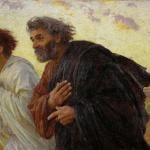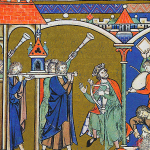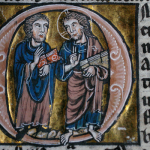STUFF FROM VERITATIS SPLENDOR that struck me for whatever reason: “Jesus’ conversation with the young man helps us to grasp the conditions for the moral growth of man, who has been called to perfection: the young man, having observed all the commandments, shows that he is incapable of taking the next step by himself alone. To do so requires mature human freedom (‘If you wish to be perfect’) and God’s gift of grace (‘Come, follow me’).” (in this post, all itals in original, all bolding mine)
“Although each individual has a right to be respected in his own journey in search of the truth, there exists a prior moral obligation, and a grave one at that, to seek the truth and to adhere to it once it is known.(58) As Cardinal John Henry Newman, that outstanding defender of the rights of conscience, forcefully put it: ‘Conscience has rights because it has duties.'”
“Taking up the words of Sirach, the Second Vatican Council explains the meaning of that ‘genuine freedom’ which is ‘an outstanding manifestation of the divine image’ in man: ‘God willed to leave man in the power of his own counsel, so that he would seek his Creator of his own accord and would freely arrive at full and blessed perfection by cleaving to God’.(64) These words indicate the wonderful depth of the sharing in God’s dominion to which man has been called: they indicate that man’s dominion extends in a certain sense over man himself. This has been a constantly recurring theme in theological reflection on human freedom, which is described as a form of kingship. For example, Saint Gregory of Nyssa writes: ‘The soul shows its royal and exalted character… in that it is free and self-governed, swayed autonomously by its own will. Of whom else can this be said, save a king?…'”
“The teaching of the Council emphasizes, on the one hand, the role of human reason in discovering and applying the moral law: the moral life calls for that creativity and originality typical of the person, the source and cause of his own deliberate acts. On the other hand, reason draws its own truth and authority from the eternal law, which is none other than divine wisdom itself.”
“It must certainly be admitted that man always exists in a particular culture, but it must also be admitted that man is not exhaustively defined by that same culture. Moreover, the very progress of cultures demonstrates that there is something in man which transcends those cultures. This ‘something’ is precisely human nature: this nature is itself the measure of culture and the condition ensuring that man does not become the prisoner of any of his cultures, but asserts his personal dignity by living in accordance with the profound truth of his being.”
“It has been rightly pointed out that freedom is not only the choice for one or another particular action; it is also, within that choice, a decision about oneself and a setting of one’s own life for or against the Good, for or against the Truth, and ultimately for or against God. Emphasis has rightly been placed on the importance of certain choices which ‘shape’ a person’s entire moral life, and which serve as bounds within which other particular everyday choices can be situated and allowed to develop.”
“The unacceptability of ‘teleological,’ ‘consequentialist’ and ‘proportionalist’ ethical theories, which deny the existence of negative moral norms regarding specific kinds of behaviour, norms which are valid without exception, is confirmed in a particularly eloquent way by Christian martyrdom, which has always accompanied and continues to accompany the life of the Church even today. …Martyrdom rejects as false and illusory whatever ‘human meaning’ one might claim to attribute, even in ‘exceptional’ conditions, to an act morally evil in itself. …Finally, martyrdom is an outstanding sign of the holiness of the Church. Fidelity to God’s holy law, witnessed to by death, is a solemn proclamation and missionary commitment usque ad sanguinem, so that the splendour of moral truth may be undimmed in the behaviour and thinking of individuals and society.”
“It is in the saving Cross of Jesus, in the gift of the Holy Spirit, in the Sacraments which flow forth from the pierced side of the Redeemer (cf. Jn 19:34), that believers find the grace and the strength always to keep God’s holy law, even amid the gravest of hardships.”
“It is quite human for the sinner to acknowledge his weakness and to ask mercy for his failings; what is unacceptable is the attitude of one who makes his own weakness the criterion of the truth about the good, so that he can feel self-justified, without even the need to have recourse to God and his mercy.”











